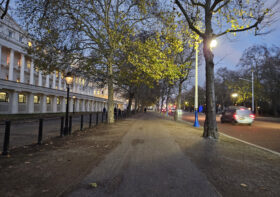Reading from memory

Memorising poems has been much in the news lately. Classrooms recitals for children seem to be making a comeback. Julianne Moore’s character in ‘Still Alice’ is seen reciting Elizabeth Bishop’s ‘One Art’. For the last National Poetry Day theme of ‘Remembering’, Tony Mitton in the Guardian offered his top ten poems for children to learn from memory.
I was always impressed at how many lines of poetry my mother could still remember and recite, nearly 80 years after she learnt them in school. She told me her sister Ivy was better at it – ‘good at spouting’ was her term for it. I liked telling her when I was going to be ‘spouting’ at a poetry reading – although in honesty, I rarely spout, because I’ve never gone to the trouble of learning my own poems from memory, and I although I did learn poems for English exams at school (because we had to quote them) I don’t think I ever recited them, except to myself.
Ted Hughes’s ‘Hawk Roosting’ was one I learned back to front and upside down. In his introduction to By Heart – 101 Poems to Remember (Faber 1997), Hughes gives us an essay on the pleasure of memorising by using imagery and the visceral senses – age-old techniques which he claims were largely eradicated during the Protestantisation of England as being somehow ‘pagan’ or ‘catholic’, to be replaced by ‘rote learning’. I wonder if the loathing of rote learning is one of the factors behind the negative attitude of many people to poetry.
So what about today’s poets? Why are we not performing more of our work from memory? Of course I’m talking about ‘page’ poets here – whatever you think of the distinction, it exists. Perhaps the word ‘performing’ is a clue. Not all poets are performers, or wish to be. And reading without the prop of a book or a sheet of paper does mean answering some scary questions – what do I do with my hands? Where do I look? and not least of all What will happen if I forget the words?
Yesterday evening I had the pleasure of hosting Telltale Poets & Friends here in Lewes, in the warm glow of the (packed) upstairs room of the Lewes Arms, and the first reader was our own Peter Kenny. I’ve heard Peter read quite a few times now, and he has a natural presence and a voice that never fails to pull you in. Last night he gave an outing to a poem I’d not heard before, which he explained had been written thirty years ago or so. It was long, and he recited it from memory. Not just that, but it was a performance – not in the sense that it seemed choreographed or rehearsed, but more that it involved his whole body – in the reciting, in the meaning of the words, in the remembering. It felt powerful, and it seemed to draw in the audience, sharp as a laser. I’ve experienced this before – Cristina Navazo-Eguía Newton is mesmerising when she famously performs her work from memory.
So I’m now inspired to memorise one or two of my own (all pretty short) poems. I’ve a number of readings coming up, the first being Poetry in the House in London next week, at which I’m the first reader. Dare I set myself the goal of performing a poem from memory? Or perhaps start with a more modest goal – having the book in hand in case I get into trouble, but not looking at it? Would that work? I’m not sure. I know when it comes to singing, I’m more able to sing confidently from memory if I don’t have the music available to fall back on.
I’m interested to know other people’s experiences of reciting or performing free verse from memory. Is it in your repertoire? Something you would like to do more, or no inclination? Do you enjoy or prefer it when poets read from memory?



My experience of performing is very limited, but the times I have done it, I made an effort to memorise the opening lines because I was so concerned that stage fright would leave me unable to read, and also so I could (try to) look at the listeners for the first couple of seconds. I’d like to be able to recite, but baby steps!
My little sister is a performance poet (Manx Poetry Slam champ two years running *proud face*), and she does do almost everything from memory. When she did her first long gig at Manx Lit Fest last year, she took a folder with all the poems in on stage with her as back up in case she needed it, but almost never referred to it. I think it helped having them there, as mental back-up. I never fail to be impressed, though, at the way she can recite long, long works. She rehearses a lot, and ties certain phrases to gestures, and the fact that she never loses eye contact with the audience does add to the experience.
So I think, try it, even if it’s just one to begin with! And I don’t think having the book if you need it will take away from the performance.
Francoise – what a talented sister you have! Two things you said jumped out at me – the fact that she practices a lot, and also that she ties certain phrases to gestures. That’s exactly what Peter said when I asked him about memorising. It’s part of that visceral thing that Ted Hughes talks about. Thanks for sharing that. I’m feeling positive about doing it… I think …
Great post. Thanks. Just a quick comment – I am presently working on learning this poem by James Wright off by heart – http://www.poetryfoundation.org/poem/177229 . I chose this poem because it is full of outdoor images that lead from one to another — and of course there’s that big thump of a memorable last line. I am NOT a natural at this sort of thing, but want to have at least a handful of poems for me & my brain to remember 🙂
Hi Elly – that’s a beautiful poem, I can see why you chose it. Good luck with memorising it (and others). It’s about the length of poem I need to start with, definitely. Let me know how you get on if you have a chance to recite it to an audience 🙂
I was stunned by Vera Pavlova’s reading at Aldeburgh in 2013, where she recited ALL of her poems. For me, it takes a reading to another place. Have you seen the YouTube clip of Kate Tempest reciting from Brand New Ancients on the Charlie Rose show? I played it to an A level class and it got their attention.
Hi John – another place, indeed! That is amazing, to just take the stage and move seamlessly between poems, all from memory, and I imagine for the performer too that would feel marvellous. I haven’t seen the clip of Kate Tempest but will seek it out and have a watch. Thanks for your comment.
[…] it from memory, having relearned it last week. Robin has been thinking about memorising her work, and she wrote about it here in her blog. I’d forgotten how freeing not having to read your work out can […]
[…] I was pleased about, because it meant I could then sit back and enjoy everyone else’s poems. I’d set myself the task last week of memorising a poem. In the end I did two from memory – the opener being a short and relatively easy to […]
I do feel my readings are better when I recite poems from memory, and I’m trying to do it more often – though I tend to have a paper copy with me just in case. You’re able to connect more with the audience and memorised words seem somehow to carry a little more emotion, maybe because there’s a sense in which you are more committed to them. Obviously it’s harder the more/longer poems you are reading though, and for those of us with busy day jobs available time to practice and to commit lines to memory is a significant issue.